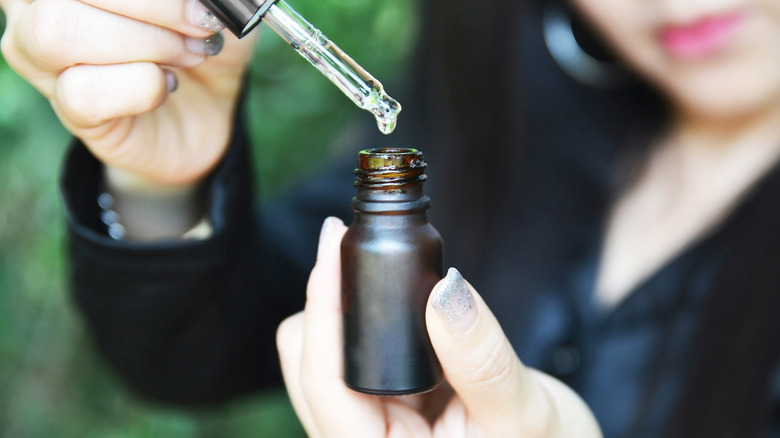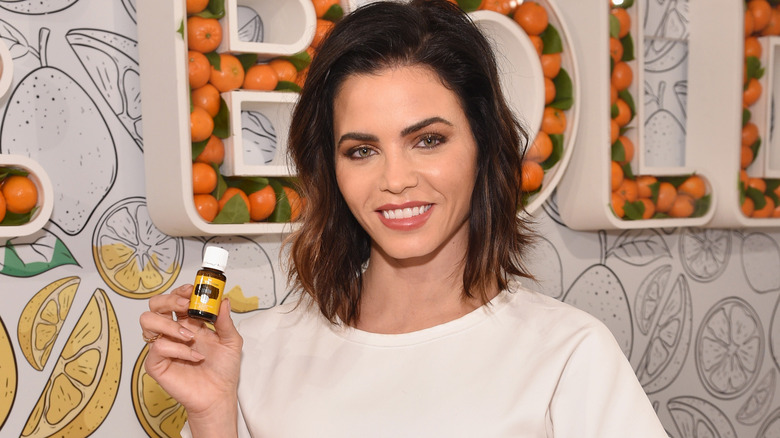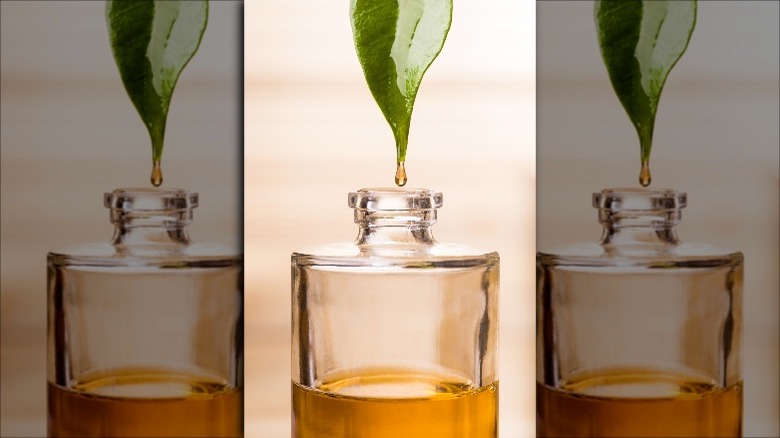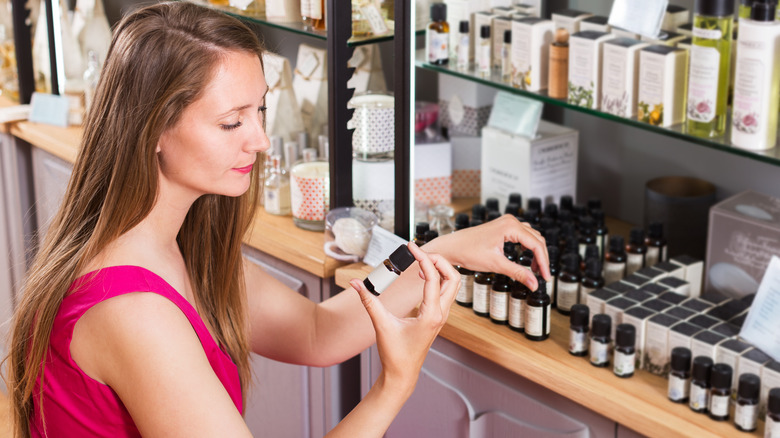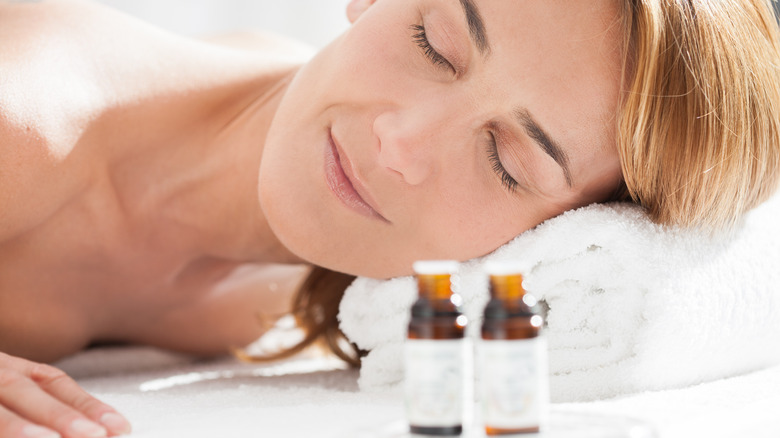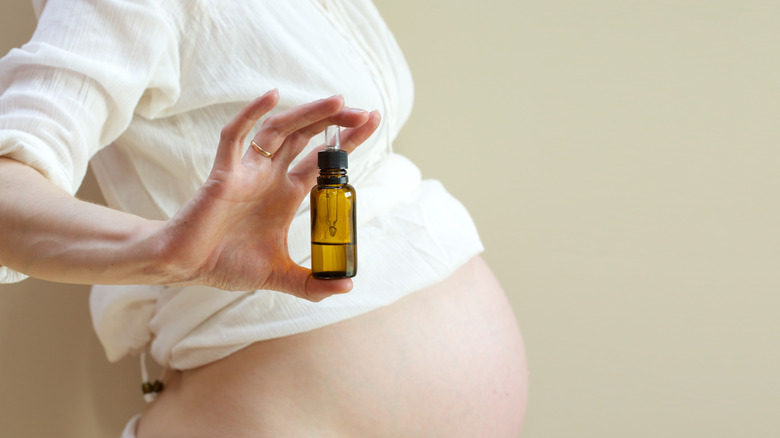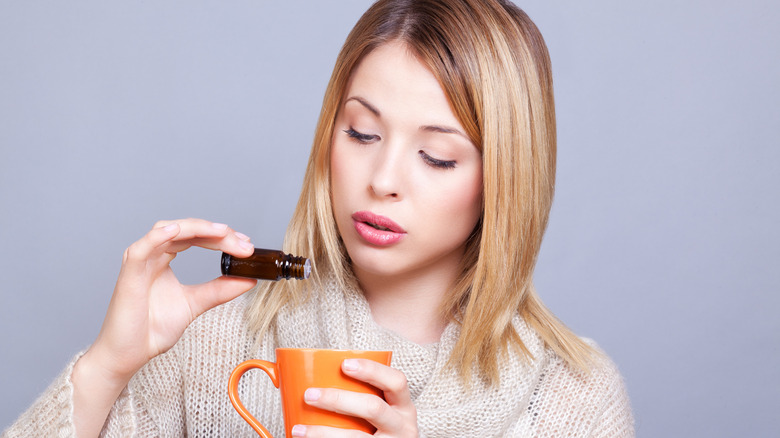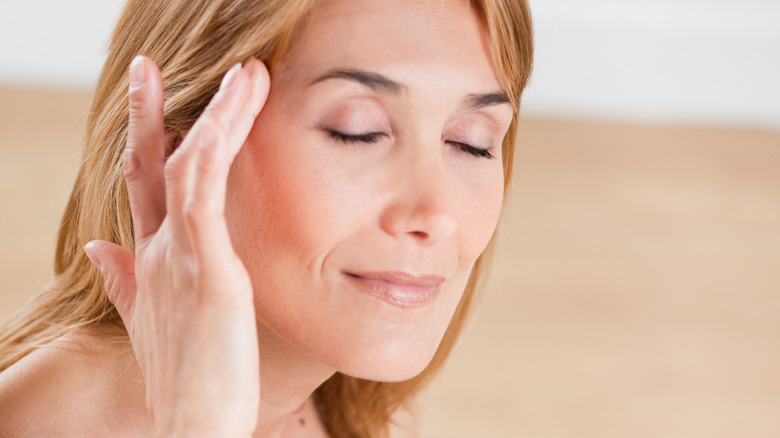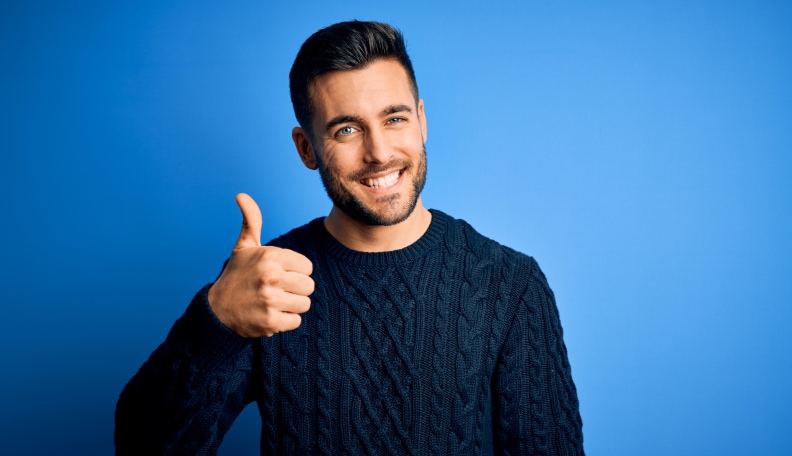Life can get messy and unpredictable sometimes, and some things are just out of our…
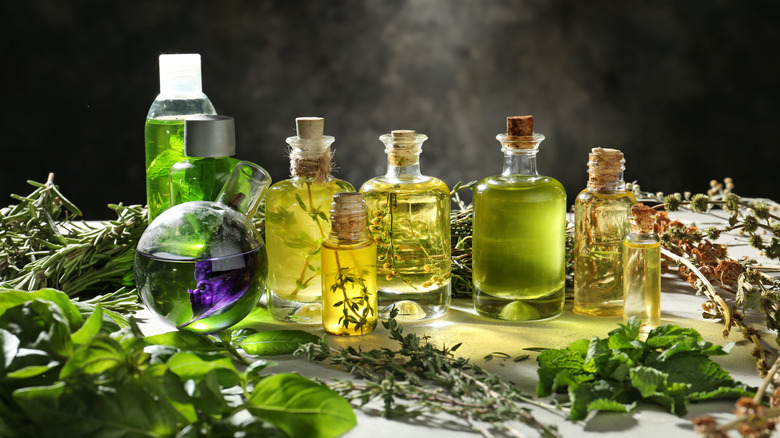
The Untold Truth Of Essential Oils
Have you tried essential oils? With more and more people turning to alternative medicine, homeopathy has become much less taboo and even widely accepted. And some use essential oils to treat minor aches and pains, whereas in the past they may have just popped an over-the-counter pill at the first sign of a headache. And since most know someone they sells them, it’s easier than ever to delve into aromatherapy. Celebrities, too, have been embracing essential oils with open arms. Scandal’s Kerry Washington keeps a bottle on her nightstand (via Marie Claire). Actress Jenna Dewan told Shape in 2017, “My friend got me into them and I was hooked — I noticed a huge difference in my mood when I used them. I use a combination of one to five every day.”
Even if you haven’t personally tried essential oils, you’ve probably been told about the myriad magical things they can do. But are they really as great as everyone claims? Here’s the truth about these incredibly popular oils.
Essential Oils Ancient history
Essential oils may seem like the latest and greatest fad, but they’ve been around for practically forever. While they may now be used as alternative medicine, they were the mainstream cure-all of the Middle Ages. According to the Encyclopædia Britannica, records indicate that essential oils were used in ancient India, Persia, Egypt, Greece, Rome, and Asia — all before eventually spreading to medieval European pharmacies.
Nearly a hundred different kinds of essential oils were in use in Europe by the mid-1700s and, prior to the 1800s, some had already started making their way to the United States. That’s not to say they were all that understood, though. It wasn’t until improvements in science in the early 20th century were made that more became known about these strong-smelling oils. With that, even more were produced. While they continued to be used as and in medicines, essential oils became more commonly used in perfume, beverages, and even food.
There’s “real money” in the essential oils biz
Essential oils aren’t cheap. A half-ounce bottle of the common lavender essential oil retails for nearly $32 on Young Living Essential Oils’ website. Still, despite their hefty price tag, many people are buying them. A spokesperson for another popular company, doTERRA, revealed to KUTV in late 2018 that the essential oil business is a $5 billion industry.
But not everyone is buying the bottles because they work — some are buying them in the hopes that they will work. “There is real money to be made in the market, money that comes from the pockets of the vulnerable, sick, and desperate,” Children’s MD, a site run by pediatricians at St. Louis Children’s Hospital and Washington University School of Medicine, revealed.
DoTERRA’s retail prices soar as high as $180 per 5-milliliter bottle. If you break that down, that’s a whopping $36 per milliliter. That’s not even a quarter of a teaspoon! That’s a hard pill to swallow for most people.
Their uses is not totally regulated by the FDA
Because essential oils don’t quite fit in any single category, they’re difficult to regulate. In fact, as of this writing, the United States Food and Drug Administration (FDA) doesn’t actually have specific regulations for the oils. While cosmetics, aromatherapy products, and drugs are all subject to different standards, essential oils are pretty ambiguous. They can be cosmetic, they can be a form of aromatherapy, and they can be considered a drug. This doesn’t mean that the FDA looks the other way when it comes to essential oils, but they evaluate the products based on their intended use.
Although you probably use plenty of things in your everyday life that don’t carry the FDA seal of approval, it’s that much more important to do your research. Regardless of the claims you may read or hear, you should learn how your essential oils are intended to be used and, of course, use as intended.
They may be natural, but they’re still chemicals
There are plenty of chemicals — like BPA (Bisphenol A) — that experts consider dangerous but that are still deemed as safe and FDA-approved. In an effort to reduce the amount of chemicals in their home, many people are turning to natural products that are both friendlier for the environment and for their families. This is a good thing for essential oil companies, as they can certainly tout that they’re all-natural. Just because something is natural, though, doesn’t automatically make it safe.
“These are not different from any other types of chemicals,” Corrine Welt, an endocrinologist and professor of medicine at the University of Utah, told KUTV. “They are organic compounds. They’re concentrated quite highly.” Cody Beaumont, director of analytical services and quality control at doTERRA, agreed that buyers need to exercise caution and went on to recommend seeking out your doctor’s opinion when sick, instead of only using essential oils.
Essential Oils Uses
People use essential oils for a wide variety of different things. Some use them to combat stress, while others use them to get a good night’s sleep. Still others use essential oils for non-medical reasons. Due to their strong scent, some people like to add essential oils to their washing machine or mix in a couple drops to vinegar-based cleaners to cut the pungent odor, as shared by The Spruce. Others simply just like to add them to a diffuser or stir them up with distilled water for an easy DIY room spray (via Insider). The stuff can even be used to freshen your carpets. “When you combine essential oil with baking soda, you will have a powerful natural carpet deodorizer and freshener,” Dean Davies, a “carpet and upholstery cleaning specialist” at Fantastic Services, divulged to Insider.
But beware — not all essential oils can be used interchangeably. Some that are safe to diffuse may not be safe in other situations.
Why you need to know your essential oils
When Stacey Haluka bought essential oils from an acquaintance who was selling products for a multilevel marketing company, she was assured that they were completely safe. She regularly infused her water with citrus oils and applied lavender oil to her skin. Upon noticing a small rash on her arm, she contacted the woman who sold her the oils, but was told the rash was just her body’s way of detoxing. The salesperson recommended an additional oil — frankincense — for the rash.
Over the course of several months, Haluka’s condition worsened. Her eyes became swollen, she had welts on her stomach and neck, and she developed blisters on her face. In the emergency room, doctors diagnosed her with a “severe toxic reaction” to the oils. “Four years later, I still struggle,” Haluka revealed to WebMD. Plenty of other people have reportedly had similar experiences, according to the website.
“There is definitely credible science behind certain benefits for certain essential oils,” said Cynthia Bailey, a California-based dermatologist. “But you have to choose wisely, and you cannot use them indiscriminately.”
Should essential oils be used on children?
Essential oils and children are, well, like oil and water: they don’t mix. “I would certainly advise teens and children not to use essential oils,” Jessica Krant, an assistant clinical professor of dermatology at New York City’s SUNY Downstate Medical Center, told WebMD.
One study found that prepubescent boys who topically applied products containing lavender and tea tree oils developed breast tissue (via The New England Journal of Medicine). The study concluded that “repeated topical exposure to lavender and tea tree oils probably caused prepubertal gynecomastia in these boys.” Other essential oils can also cause problems in children. Both eucalyptus and peppermint oils contain phenol, which can cause irritation to the respiratory tract when breathed in (via WebMD). This is especially dangerous for babies.
Essential oils have been around for hundreds of years, but we’re still learning all there is to know about them. While some kinds may be safe for use on or around children, endocrinologist Corrine Welt, a professor of medicine at the University of Utah, feels that more studies are needed, as she told KUTV.
What about using essential oils to pregnant women?
Pregnant women need to be especially careful when choosing essential oils. Oregon-based doctor of naturopathic medicine, Jill Edwards, who specializes in prenatal care, told Parents that women should avoid all essential oils in the first trimester. This is because some oils can cause harmful effects to a developing baby. However, later in a woman’s pregnancy, she can start using select oils. “In the second and third trimesters, some essential oils are safe to use, as your baby is more developed,” Edwards revealed to the publication. According to the doctor, lavender, chamomile, and ylang ylang are safe by this point.
But it’s important to note that throughout your entire pregnancy, you’ll want to avoid any and all oils that cause contractions, like cinnamon and clary sage. And before determining if any essential oil is safe for use during your pregnancy, it’s a good idea to schedule a visit with your doctor to know what’s safe for you personally.
No matter what, don’t do this with essential oils!
Pregnant or not, there is something no one should do with essential oils, and that is ingesting them. Even if an essential oils sales rep says it’s okay, it’s not. When speaking with WebMD, neuropsychologist and aromatherapist Joie Power revealed that the body absorbs more of the oil when swallowed and that increases the chance of experiencing a “toxic reaction.”
Emergency medicine physician Alexis Halpern, who works at New York-Presbyterian Hospital and the Weill Cornell Medical Center, told Refinery29 that she’s a fan of essential oils when they’re used appropriately. “But eating them… I don’t believe it’s actually been proven safe anywhere,” she revealed.
If you wouldn’t drink poison — and we know that you wouldn’t — don’t go slurping down your essential oils, because that’s essentially what they become when swallowed. The National Capital Poison Center confirmed that essential oils are indeed “poisonous when misused.”
Can essential oils really do what people say?
Although doctors like Alexis Halpern agree with using essential oils, not everyone is as convinced. Stephen Barrett, a “retired psychiatrist and consumer advocate,” told Mic that essential oils are good for one thing and one thing only: their scent. “The idea that it’s a medical system is preposterous,” he stated. “There are a number of books written saying that this oil can help this condition and that oil can help that condition. I think that’s all a wad of bologna.”
Other medical experts take a more nuanced approach. “What they are and what they do depends on what plant they’ve come from (and sometimes what part of the plant),” wrote pediatrician Roy Benaroch. Select essential oils, like wintergreen and clove, have “clear medical uses,” according to the doctor, but others can be harmful.
Benaroch further explained that his issue is more with the companies selling the oils than the oils themselves. “Don’t waste your money or endanger your health — stay away from the multilevel marketing of essential oils,” he cautioned.
Essential Oils can’t cure diseases
Pediatrician Roy Benaroch isn’t the only one who’s taken issue with some of the wild claims that multilevel marketing companies have made about essential oils. The Food and Drug Administration has also taken notice. In 2014, the FDA sent letters to both Young Living and DoTERRA, warning them that the “marketing and distribution” of their products “without FDA-approved applications” was a violation. Many of the claims that had been made by both companies’ representatives would serve to classify the oils as medicine, and thus would need to be regulated by the FDA. And some of the claims were out there.
“Viruses (including Ebola) are no match for Young Living Essential Oils,” read one claim. “Peppermint oil has so many more uses … asthma, autism, brain injury … Crohn’s disease … multiple sclerosis, paralysis,” said another. DoTERRA’s health claims were just as grandiose, touting uses for Grave’s Disease, Alzheimer’s Disease, and even tumor reduction.
Essential Oils Benefits
Despite the bold claims of curing a wide variety of incurable diseases, it’s true that essential oils have scientifically proven benefits. Peppermint oil has been found to be useful in treating headaches, and lavender oil has been shown to have a positive effect on sleep. A study in mice showed that thyme and oregano oils were able to induce remission of colitis, which could potentially be offer promising results for human sufferers. Essential oils are even fairly useful as mosquito repellent and, of course, they just smell so dang good.
So, while essential oils may not be able to cure your high blood pressure, curb your anxiety, or pull you out from the depths of depression, science has already shown that they can do some pretty incredible things. No, they’re not exactly the miracle product many companies have claimed, but — when used safely — they may just be worth your while.

